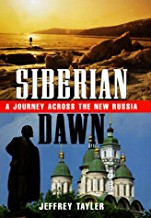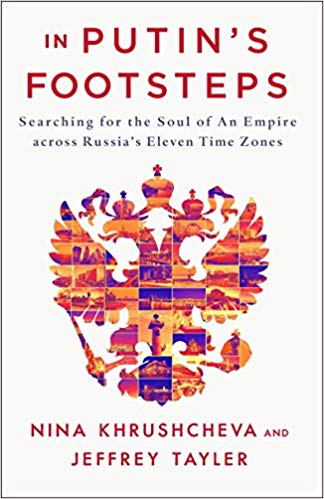Review–In Putin’s Footsteps by Nina Khrushcheva & Jeffrey Tayler (Russia)
IN PUTIN’S FOOTSTEPS: Searching for the Soul of an Empire Across Russia’s Eleven Time Zones
St. Martin’s Press
By Nina Khrushcheva and Jeffrey Tayler (Morocco 1988-90)
320 pages
February 19, 2019
$18.89 (hardback); $14.99 (Kindle); $24.60 (Audio CD)
Reviewed by Bea Hogan (Uzbekistan 1992-94)
Why is Putin so popular? The hand-picked successor of Boris Yeltsin was an odd choice: a soft-spoken former spook who’d once helmed the Federal Security Service (FSB), the agency that came after the KGB. Putin took power as the new millennium dawned, and at the time, seemed destined to be a placeholder, a mere footnote in history. But three months later he won the presidential election in a landslide and has been consolidating power ever since. It’s hard to imagine how a man of diminutive stature and unassuming presence—in a land that prizes macho men—could become such a towering figure on the world stage. And yet here we are.
In Putin’s Footsteps, co-written by RPCV Jeff Tayler and New School professor Nina Khrushcheva, attempts to unravel the mystery of Putin’s appeal, especially among the people in Russia’s hinterlands, who form his political base. The authors, both fluent in Russian, come with unique credentials: Jeff Tayler, a Moscow-based journalist, has lived in Russia for more than twenty years, and Nina Khrushcheva, a New York-based journalist, grew up among Russia’s political elite, as the great granddaughter of former Soviet premier Nikita Khrushchev.
Together they set out to find answers. Their journey, which spans Russia’s eleven time zones, was inspired by the address Putin gave on New Year’s Eve as he was about to take office: “Russia is an enormous country, a great country,” he exhorted his fellow Russians. “We need to remember that our strength is our size. What if I were to travel through Russia limitless land in one night, through all its eleven time zones, stopping in each one at midnight local time to record the New Year’s message to show our nation’s greatness, our riches, the diversity of our Mother Russia, our unity, our worth?”
It was an ambitious plan that was quickly panned because, as the writers point out, “covering eleven time zones in eleven hours … could only be done in a magic sleigh, not in an actual airplane.” Nearly twenty years later, Tayler and Khrushcheva dusted off Putin’s itinerary and mapped out a realistic timeframe. Their journey unfolds over the spring and summer of 2017, and each chapter of In Putin’s Footsteps features a town or region in one of the time zones, from Kaliningrad on German’s border to Petropavlovsk-Kamchatsky above Japan, with memorable stops along the way in Arkhangelsk and Solovetsky Islands, where the writer Solzhenitzin toiled in a gulag, Kiev, the site of 2004’s Orange Revolution, and Irkutsk, a city known as the Paris of Siberia.
What is valuable about this book its authenticity. Tayler and Khrushcheva interview ordinary Russians: fishermen, waitresses, day laborers and museum guards. These are not the usual sources Moscow-based journos tap for their dispatches or DC analysts consult for their white papers. Each page sparkles with insights, seamlessly blending lyrical passages with historical and literary nuggets. The writers note that Mikhail Bulgakov’s satirical masterpiece The Master and Margarita served “as an unofficial cicerone throughout our travels across Russia.” Case in point: “Trump coffee,” offered at an Omsk coffeehouse, provoked debate among locals not about America’s presidential politics, but instead about whether the drink’s caramel topping achieved “the exact tinge of Trump’s hair.” When the writers asked whether the item’s intent was to mock or marvel at Trump, the waitress, in Bulgakov fashion, demurred: “As you like!”
And that’s what I liked about the book—conclusions that were not preconceived and knowledge that was easily digestible. I felt like I got all the nutritional benefits from eating a kale salad without having to chaw through the stalks. For example, I learned that time zones are political. Russia, with its eleven time zones, has more than any other country in the world, which “bespeaks its status in a way no one can deny,” the writers note. But according to Greenwich Mean Time standards, this is an exaggeration: Russia should only have seven. And China, by the same metric, downplays its time-zone potential: “China’s huge landmass should straddle five different time zones, yet operates according to just one. Inhabitants of western China, if they follow their clocks, have dark mornings and light evenings, but nobody doubts that only the Beijing time matters.”
This was not Tayler’s first transcontinental trip—but it was his first since 1993, which he took after a brief stint setting up the Peace Corps program in Uzbekistan. His debut Siberian Dawn recounts that trip, and I remember buying it at Kramer’s Books in D.C. shortly after I returned stateside. Tayler was a staffer and I was a volunteer in that program, and I remember chatting with him over pomegranates and cracked walnuts at our training site in Tashkent. The year was 1992, and then-Peace Corps Director Elaine Chao had ordered 250 volunteers to the former Soviet Union—the Uzbek cohort fulfilled the political quota with days to spare (we arrived six says before Christmas). Jeff was not long for that world. “The experience in Tashkent,” Tayler writes in the prologue of Siberian Dawn, “proved disappointing professionally and devastating personally.”
Thankfully for Jeff, once he left Uzbekistan, his prospects soon improved. He moved to Moscow, married a Russian woman and continued to file dispatches and write books. In Putin’s Footsteps reflects the work of a seasoned story-teller, a master of his craft. I loved that for this book, Jeff teamed up with a woman, since so many travelogues are written by men, and Nina’s voice added a different perspective. Once the pair reaches the Chinese border, only Nina, with her Russian passport is able to cross the Amur River to explore Heihe, while Jeff, an American citizen, waits back in Blagoveshchensk. Nina barely survives a stampede at the turnstile, and she muses about how her treatment reflects two militaristic states with little respect for the individual: “the chelnoki hated me just because I was there, I was a competitor for space, for air to breathe, for a turn at the passport booth. Why weren’t they furious with the officials and their callous treatment?”
The ability to divert attention away from the powerful and stoke competition among individuals is the work of puppet masters, and in this Putin is genius. Though Western media may deride him as a dictator, Putin is able to convince working people that he is on their side, that he too is an underdog fighting for them to restore Russia’s glory. It was galling when Obama called Russia a “regional power,” only justifying Putin’s flex when he annexed Crimea in 2014. For Russians, this was a reclamation: In 1783, when Catherine the Great seized the territory from the Crimean Khanate, and it had remained under the Kremlin’s jurisdiction until 1954, when Nikita Khrushchev transferred it to Ukraine for administrative and economic reasons—but “uppermost was the desire to overcome Stalin’s legacy of central control.” Nina would know.
I got a whiff of this when I was a volunteer: Gorbachev, whose Glasnost reforms led to the Soviet collapse, was lauded in the West as a hero, Time magazine’s “man of the year.” But at home, at least among the people I met, he was cursed as an idiot for plunging the country into chaos, for putting political reforms before economic. People had heard of the Peace Corps before, but associated volunteers with Third World squalor. For them, citizens of a former superpower, it was almost insulting that we come to teach them a thing or two. (Believe me, I am the first to admit that I was unqualified for my post and was damn lucky I survived).
After reading In Putin’s Footsteps, I feel like I now have a clearer understanding of Putin’s popularity, even as I’m at a loss to explain how my copy of Siberian Dawn has survived more than twenty years and as many decluttering campaigns. I’ll chalk it up to one of the Peace Corps’ enduring mysteries: how those two years continue to shape your life long after your service ends.
Bea Hogan (Uzbekistan 1992-94) is a senior associate editor at The Atlantic, where she fact checks stories for the magazine. She’s held a variety of editorial jobs, from editing YA books to researching magazine articles, proofreading books and writing newsletters. Early in her career, she did a stint at Radio Free Europe/Radio Liberty in Prague and later, ran the research department at More Magazine for ten years. In 2001, she returned to Central Asia on an International Reporting Project fellowship and during that trip, reconnected with her students from Samarkand State University in Uzbekistan.

Nice review. As a diplomat, I had the chance to travel the globe but never landed in Russia. If I didn’t suspect that the Russian security services would still want to harass me as a retired U.S. diplomat, I might plan a trip. Thanks for this.